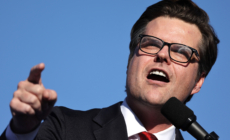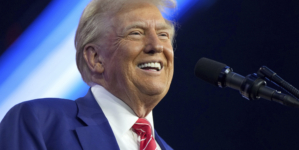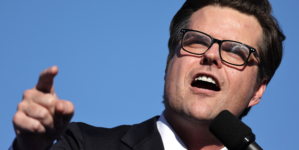-
Tears at Reason Behind Rescue Dog’s Dramatic Reaction To Being Left Outside - 19 mins ago
-
From the Surf to the Sermon: The Christian Surfers of Costa Rica - 32 mins ago
-
Who Is Stephen Miran? What Trump Adviser Pick Has Said About the Economy - 54 mins ago
-
These Spiritual Democrats Urge Their Party to Take a Leap of Faith - about 1 hour ago
-
Matt Gaetz Ethics Committee Report: What to Expect in Monday’s Release - about 1 hour ago
-
Visitors to Riverside’s Festival of Lights warned of parking scam - 2 hours ago
-
Letter Calling for Tracking People of Color Circulates in an Oregon County - 2 hours ago
-
Eagles’ Jalen Hurts Officially Ruled Out With Concussion - 2 hours ago
-
Possible rain, high surf forecast for Los Angeles area in holiday week - 2 hours ago
-
Tiger Woods Son Charlie Hits Epic Hole in One While Playing Alongside Father - 3 hours ago
Were Hitler’s Generals Loyal? Historians’ Verdicts
In August 2022, Donald Trump was quoted allegedly expressing his dissatisfaction with U.S. generals, stating he wanted them to show “total loyalty” similar to what he believed Adolf Hitler’s generals exhibited during World War II.
However, Trump has denied making these statements, asserting that he did not make any such comments about Hitler’s generals or expectations of loyalty.
This controversial remark was disclosed in the book The Divider: Trump in the White House by journalists Susan Glasser and Peter Baker.
The book reports that Trump expressed frustration with U.S. military leaders, contrasting them unfavorably with what he perceived as the strictly loyal nature of Hitler’s generals.
During a conversation with then-Chief of Staff John Kelly, Trump reportedly questioned: “Why can’t you be like the German generals?” When Kelly reminded Trump that Hitler’s generals had attempted to assassinate him on multiple occasions, Trump allegedly replied: “No, no, no, they were totally loyal to him.”
This alleged remark reappeared amid Trump’s 2024 presidential campaign after Kelly confirmed his version of events to The Atlantic. But in a public response, Trump called any suggestion he admired Hitler’s leadership “ridiculous.”
In light of Trump’s alleged comments comparing U.S. military leaders to Hitler’s generals, Newsweek reached out to prominent historians to ask whether Nazi generals were indeed “totally loyal” to Hitler. Here’s what they said.

Michael M. Santiago/Getty Images
Claudia Koonz, Historian, Duke University
“Loyal” is the wrong word to describe Hitler’s generals—”intimidated” or “cowed” fits better.
Starting in early 1944, most generals sensed the inevitability of defeat and wanted to plan damage control. But they served under Hitler, a delusional commander-in-chief who fired generals for voicing even a slight doubt about German victory.
Hitler’s rejection of reality cost hundreds of thousands of lives and catastrophic destruction.
Military command structures are, by definition, authoritarian, but their effectiveness depends on accurate information and rational discussion among civilian and military leaders. Fantasy has no place.
Richard J. Evans, Historian and Author of Hitler’s People
When Hitler came to power in 1933, his generals were not loyal Nazis. Most came from the Prussian aristocracy, a group traditionally wary of Hitler’s populism and Nazi ideology.
However, they shared his resentment of the Treaty of Versailles and cautiously supported his rearmament policies.
As the war progressed, though, many generals distanced themselves, fearing his extreme policies and impulsive military decisions. By 1944, some even joined assassination attempts. Hitler eventually distrusted them, placing more faith in the SS.
In the end, the strained relations between Hitler and the military did not lead to open revolt; even in the attempted coup of July 20, 1944, almost all the top generals remained outwardly loyal.
Those most opposed had long been forced to retire or resign. Many of those who remained claimed after the war to have been bound by the oath of personal loyalty they were forced to swear to Hitler. But that did not mean they approved of everything he did.

© CORBIS/Corbis via Getty Images
Peter Fritzsche, Professor of History, University of Illinois
Most of the military—from soldiers to officers to generals—were loyal and ideologically aligned with Hitler. The price of disloyalty was very high. There were differences over tactics, but these sorts of disagreements were also considered questions of loyalty.
On the whole, what is remarkable about Germany in World War II is the ideological cohesion among the military rather than any incoherence, something tightened by the initial victories and unraveling only at the very end, in 1944 and 1945.
By 1939, and certainly by 1941, Hitler’s generals were fully aligned with his goals. They were committed to overturning the post-World War I order and attaining a German empire, and they were intoxicated by early successes.
A few generals honored old-fashioned military virtues or hesitated in participating in the slaughter of civilians, but they were in the distinct minority. For most of them, the rigors of fighting on the eastern front only increased the value of fighting a merciless war—Hitler’s war.
Robert O. Paxton, Professor Emeritus of Modern European History, Columbia University
I noticed Trump’s alleged remark about the German generals being loyal. Trump is totally ignorant of history, of course.
A group of German generals tried to assassinate Hitler on July 20, 1944—a very famous incident. In the late 1930s, German generals often protested against Hitler’s aggressive moves, but they always fell into line until defeat was at hand in 1944.
Even when they weren’t trying to kill him, even when they were winning battles for him, the generals didn’t think much of Hitler.
They often argued with him about strategy and tactics and had little time for his amateur thoughts on military affairs. The generals argued, resisted, and doubted their leader, especially during the final phases of the war.
Dr. Gerhard L. Weinberg, Professor Emeritus of History, University of North Carolina
The German generals were overwhelmingly and continually loyal to Hitler. As the course of the war turned increasingly against Germany in late 1941 and even more in 1942 and 1943, some of the generals began to have doubts about Hitler’s decisions.
In 1944 and 1945, a few truly turned against him and hoped to end his rule. However, with minimal exceptions, they were quite willing and often enthusiastic to go along with his plans for war, the killing of Jews, the slaughter of Soviet prisoners of war, and other horrendous policies.
During World War II, under Hitler’s orders, the Nazi government initiated a program to systematically kill disabled German veterans of World War I, and later, near the end of World War II, began the killing of disabled German WWII veterans.
Germany’s WWII generals had nothing to say about the murder of their fellow WWI veterans or their own WWII subordinates. In my opinion, that silence speaks volumes about their attitude toward Hitler and his policies.
Source link




















